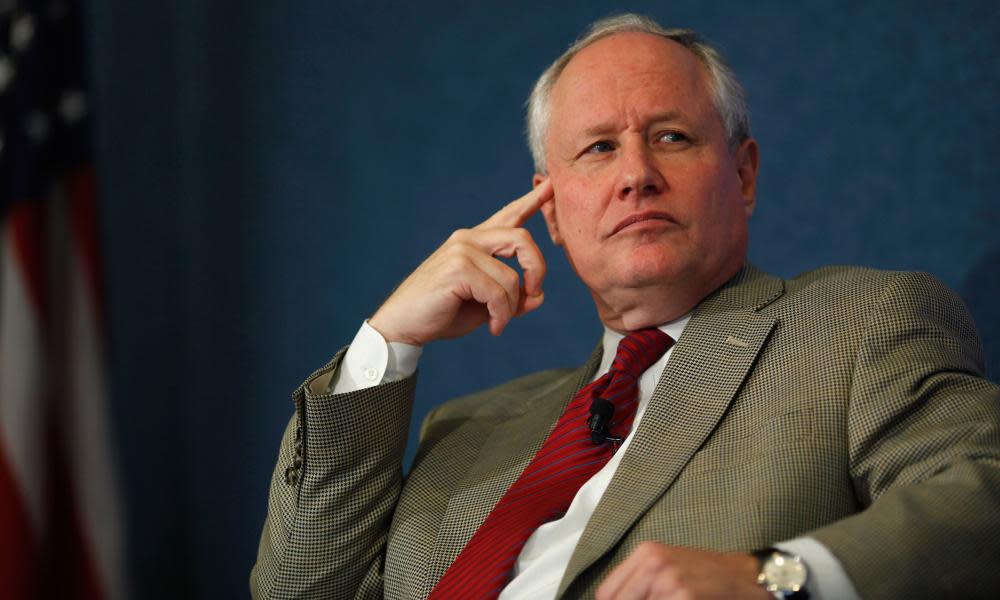Weekly Standard, rightwing magazine opposed to Trump, closes after 23 years

The Weekly Standard, one of the last holdouts opposed to Donald Trump within rightwing media, has been closed after 23 years, silencing its hawkish voice on foreign affairs and its non-ideological brand of conservatism at home.
The magazine’s parent company, Clarity Media, announced the closure on Friday, blaming the shuttering of one of the most august conservative titles on the declining number of its digital subscribers. “This was the step we needed to take,” the company’s president and CEO, Ryan McKibben, said in a statement.
Bill Kristol, a co-founder of the Standard in September 1995 and its figurehead, was measured in his response, coyly tweeting out to the owners a recording of Edith Piaf singing Non, Je Ne Regrette Rien. In the final edition of the publication, the staff writer Alice Lloyd took a similarly wry approach by penning a piece on literary last lines.
But as another co-founder, John Podhoretz, noted, only staff members were bound by non-disparagement agreements. And Podhoretz is not a staff member.
He let rip in a column in his own outlet, Commentary, in which he accused Clarity Media’s corporate owner, the billionaire entrepreneur Philip Anschutz, of “murdering” the Standard in order to cull its subscribers and harvest them on behalf of other elements in his empire. Clarity Media’s primary holding is the Washington Examiner, which has toed a notably more pro-Trump line.
With the internal ructions only beginning, an argument that is likely to rumble on is the role that the magazine’s hostile approach to Trump played in its downfall. Kristol in particular hooked his reputation firmly to the “Never Trump” camp and has become a leading figure of internal conservative Trump resistance.
Anschutz has in the past been lukewarm in his support for Trump, so pure ideological disagreements may not fully explain the rift. However, as a money man he appears to have decided to go with the flow – accepting the grip that Trump currently holds over the conservative movement and placing his chips with the Examiner.
In his column, Podhoretz takes umbrage at the argument that the Standard’s Never Trump stance did it in. “I do not believe that is the case,” he writes, arguing that the fissures within the conservative movement merely provided Anschutz with an excuse to kill off the title for financial reasons.
The closure brings to an end more than two decades in which the Weekly Standard punched well above its weight. Backed initially by Rupert Murdoch’s News Corporation, which sold the magazine to Clarity Media in 2009, it became the bible of neo-conservatism.
As such it provided a platform to core neocons who would go on to play key roles within the rightwing universe. They included John Bolton, the current national security adviser, and David Brooks, now a columnist at the New York Times.
Domestically, the magazine staked an outsider’s position from the start, backing the more fluid “maverick” politics of John McCain over Republican hardliners led by Newt Gingrich. But internationally it became best known for its hawkish voice and the influential role it played in persuading George W Bush to invade Iraq in 2003.
The title’s full-throated advocacy for the disastrous Iraq war will forever remain a contentious mark on its record. But its departure will have consequences, pushing America’s conservative media by default increasingly in the direction of undiluted Trump loyalty, even at the expense of factual accuracy, as shown by outlets such as Breitbart and Fox News.
Stephen Hayes, the final editor of the Weekly Standard, hinted at that drift in a statement responding to the closure. He said that the magazine had provided a “fiercely independent voice” that was “needed now more than at anytime in our previous 23 years”.

 Yahoo News
Yahoo News 
